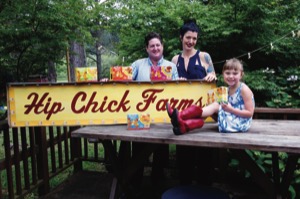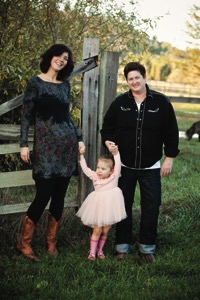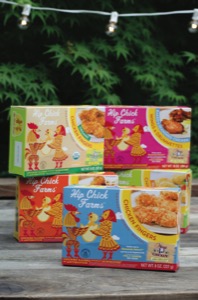
How Serafina Palandech and Jennifer Johnson are changing the eco-friendly food industry one chicken at a time
This wasn’t supposed to be how the narrative turned out. Two married women, Serafina Palandech and her wife, Chef Jennifer Johnson, formerly of acclaimed restaurant Chez Panisse in Berkeley, go on a show called West Texas Investors Club on CNBC and win a $500,000 investment from the shows’ hosts, self-made millionaires Mike “Rooster” McConaughey – brother of Oscar-winning actor Matthew – and Wayne “Butch” Gilliam, who made their fortunes deep in the heart of Texas.
Except, instead of the predictable drama you might expect from a couple of married lesbians auditioning for a chance at some serious venture capital in the reddest part of a state still reliably red, and in a world still overwhelmingly dominated by straight white men, we discover that, as it should be theoretically speaking, they won the old-fashioned way: a good product with a good business strategy and a proven, albeit nascent-ish, track record.
Johnson and Palandech and their daughter, Rubyrose, raise chickens (and horses and dogs and cats and, yes, mini-donkeys) on The Ramblin’ Rose, their farm in Sebastopol, Calif., a rural town of just under 8,000, an hour’s drive north of San Francisco. The chickens, the stars of their burgeoning empire, have all the eco-friendly labels people have to come to expect in our gluten-free society: Organic and/or antibiotic free, humanely certified by an independent certified agency, transparently sourced, 100 percent all-natural and free of fillers, preservatives and stabilizers.
The results of all this attention to the way a chicken is raised and treated have paid off handsomely for the two. According to Fortune, “Hip Chick’s organic chicken products are now in over 400 supermarkets, including 170 Whole Foods locations nationwide. Whole Foods put Hip Chick Farms on the map through its Local Producer Loan Program. Erin Harper, who runs the program for Whole Foods, says she received the application for Hip Chick Farms in February of last year and the loan was finalized in May.
For their part, Whole Foods seemed to encapsulate the prevailing trend in eating these days: “Serafina and Hip Chick Farms are absolutely representative of what this program is about. They’re working to change the way the world eats,” says Harper. “This was created by concerned mothers who wanted to feed their child with a healthy product,” she continues. “That resonates with a lot of our customers.”
When you go to their Web site, HipChickFarms.com, you’ll find recipes, a video, certificates of authenticity and much, much more. What you won’t find, as the narrative now makes clear, is much drama.
(You can find Hip Chick Farms’ chicken fingers and other of their assorted frozen foods at the local Whole Foods at 711 University Ave. in Hillcrest.)

San Diego LGBT Weekly: Whole Foods provided seed money for your venture and was struck by how unremarkable it was regarding your relationship. As two married women, how important is your lesbian identity to your business?
Jennifer Johnson and Serafina Palandech: Hip Chick Farms has always led with our core values of transparency, compassion and trust. Transparency of how we make our products, what’s in them, how the chickens are raised and who we are as a family. Whole Foods was one of our first customers and they brought in our products because of the great taste, high quality and ingredients. While we have been transparent about our family and who we are, grocery stores seem to be very focused on quality and organics above all else. Whole Foods has very specific regulations and vetting on products to be carried in their stores and we are one of the few companies in our category that can meet those standards – including Humane Certification through Global Animal Partnership as Step Three rated.
The PR release about your win on CNBC’s West Texas Investors Club goes to lengths to stress that your victory was a $500,000 coup in a conservative – business, Texas, venture capitalists – environment. Having lived in the Southwest for ten years, I find people are very live-and-let-live. Was there pressure on either of you at any time to play up your orientations?
We originally wondered if there would be a culture clash in presenting our family business to the investors on the show. However, as you stated, everyone we met in West Texas was awesome. We really got to know Butch and Rooster, met their families, and learned a lot about each other. The investors were interested in getting to know us and our business plan. We established trust and mutual respect quickly, and that was reflected in the episode.
Whole Foods has had a substantial financial hand in your venture. How did you come to them or them to you?
Whole Foods has a mandate to loan over $20 million to small food producers. We applied to their Local Producer Loan Program when we were seeking funding to print new packaging. They supported us with a $35,000 loan in 2014, and have been fantastic partners in assisting us grow.
Your frozen chicken fingers come in 8 ounce boxes in the frozen foods section of Whole Foods on University Avenue, for example, and they cost around $7. That sounds really reasonable given how well you treat your livestock. So how many chickens are in that box? Do children ever ask where the chicken fingers come from or why they’re called “fingers?”
Hip Chick Farms uses only breast meat to make our chicken fingers. We don’t add any fillers or additives. At our in-store demos, kids ask us all the time – do chickens have fingers? We reply that our daughter, Rubyrose, called them chicken fingers because of the shape and size, and the name stuck!

How was your business relationship an outgrowth of your personal one?
Jen and I work really well together – and we work to each other’s strengths – and weaknesses. We each bring a really different skill set to the business which makes us stronger. Starting this business has been the hardest thing we have ever done, but even in the hardest, most challenging days, we have found strength in each other and in our love.
I watched videos of organically-grown, free range chickens being slaughtered. It was disturbing, to say the least. So is there a humane way to discuss, let alone execute, their deaths? It’s unpleasant but it seems entirely glossed over by the food industry no matter how well they’re treated. What happens to your chickens once they leave your farm?
We have grown really quickly, so we have to source from other farmers not from our farm. Right now, we source from four other farmers that meet our standards. There are more humane ways to process birds; specifically, chickens can be harvested at night, when they are calmer. The birds are passed through a chamber that removes the oxygen and puts them to sleep, prior to slaughter. We believe this is the most humane way to kill a chicken and produces less stressed meat.











